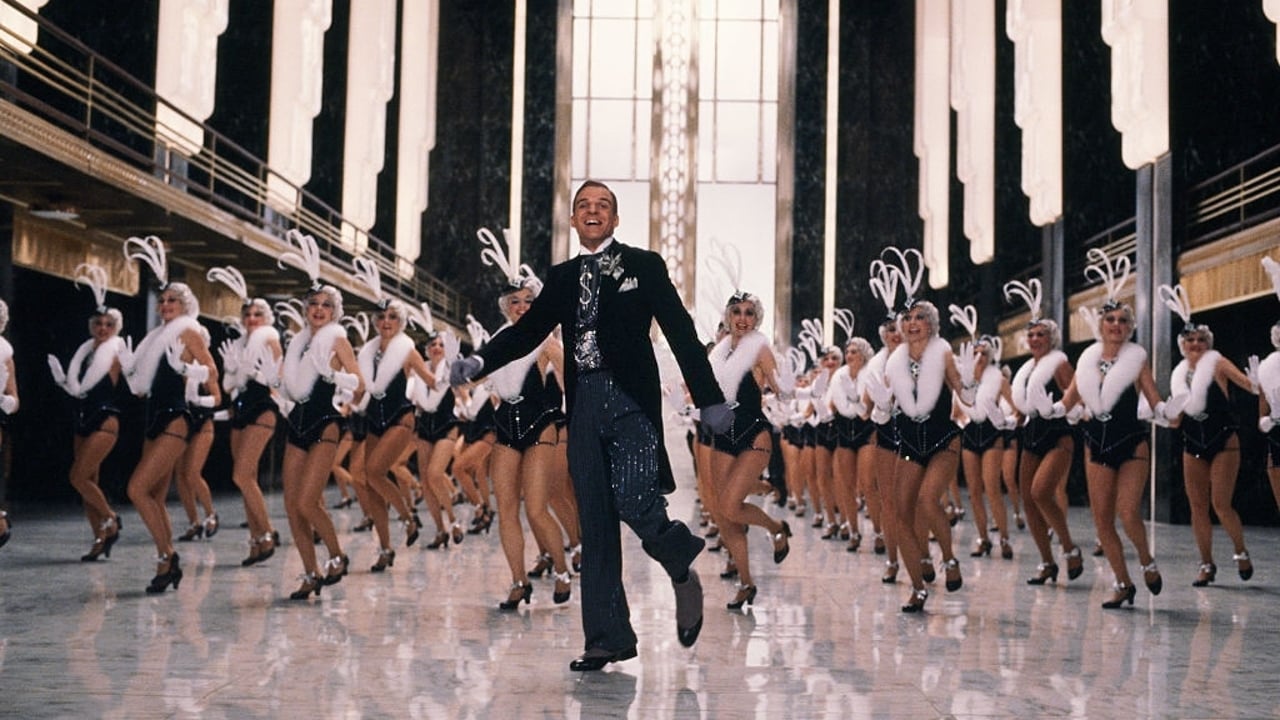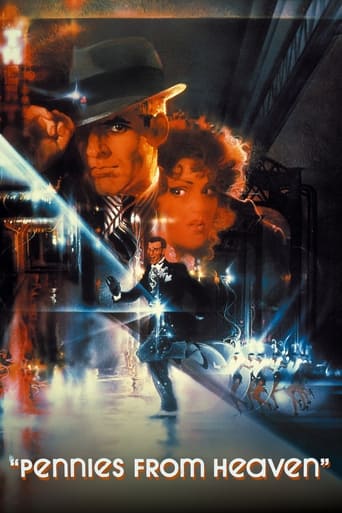Brightlyme
i know i wasted 90 mins of my life.
SincereFinest
disgusting, overrated, pointless
BoardChiri
Bad Acting and worse Bad Screenplay
Brendon Jones
It’s fine. It's literally the definition of a fine movie. You’ve seen it before, you know every beat and outcome before the characters even do. Only question is how much escapism you’re looking for.
Robert J. Maxwell
It's the depths of the depression in 1930s Chicago. Willie Loman -- I mean Steve Martin -- tries to sell sheet music. He loves the songs, although business is not going too well. He'd like to own his own record store but hasn't the capital. That stash belongs to his soulless wife, Jessica Harper, who believes that sex is dirty and wishes someone would cut Martin's "thing" off. For all that, he at least has an unprepossessing but adequate lower middle-class home. It's just that he has this itch that things could be better.Whenever he gets this itch he scratches it with a fantasy musical number. No harp arpeggios or watery dissolves. At the end of a fierce argument with the bank, there's a sudden cut and he and the banker are arm in arm, dancing and singing some song from the 1930s. The original recording plays. Sometimes Martin's voice is that of the female.True to his magical thinking, he falls in love at first sight with Bernadette Peters, a shy school teacher. He pursues her, seduces her, and impregnates her, which leads to her being fired, finding employment under a pimp (Christopher Walken), and running off with Martin without any plans. Their car breaks down under a bridge. Martin is arrested for a murder he never committed and hanged -- except that he and Peters kind of break the fourth wall and come together in a clinch at the end, with Martin observing that every movie must have a happy ending.Well, no movie with Christopher Walken dancing on top of a bar in a louche saloon, and Tommy Rall hurling himself through the air, can be all bad. And this isn't all bad. The dancing is surprisingly effective. Herb Ross, the director, used to stage and choreograph musicals and he knows what he's doing. The songs are Golden Oldies, with vocals by Rudy Valee, Bing Crosby, and Betty Boop. Bernadette Peters has a kewpie doll face, full of sex, and she has a firm grasp on her role.But the movie isn't an entire success either. It's more or less torpedoed by its own ambition. It seeks to evoke the desperation of the depression and it does the job all too well. The clothing is drab, the set dressing ditto, the characters hopeless, and the story bleak, except for that happy ending, straight out of Ambrose Bierce's "An Occurrence at Owl Creek Bridge." The sepulchral picture of real life overwhelms the plot and the musical numbers seem more like distractions than anything else. Yes, Martin does a fine imitation of Fred Astaire dancing with Ginger Rogers to "Let's Face the Music and Dance," twirling around and holding his hands in the air, but I kept wondering WHAT'S GOING TO HAPPEN TO HIM? For what it's worth, I seem to recall even better mimicry of Astaire by Martin on Saturday Night Live, with Martin falling over the furniture and eventually, happily, smilingly, tap dancing his way through a penthouse window.That SNL sketch was amusing. The movie prompts you to slit your wrists.
Hot 888 Mama
. . . rampage as a human wrecking ball versus females throughout PENNIES FROM HEAVEN (1981) and NOT echo the words of his wife Joanie (Jessica Harper), who tells the cops toward the end of this tawdry tale, "they need to cut it off and bury it" before this serial heart-breaker is strung up. While Arthur (played by Steve Martin) is not exactly Ted Bundy, he wants Joanie to go about her daily chores Panty-less, with red lipstick smeared "on the points of my bosom," to use her words. Maybe YOU can imagine even kinkier things that a spouse might request, but the story for the 1981 version of PENNIES FROM HEAVEN takes place in 1934 Chicago, where such perversions must have been virtually unknown. After what Arthur is shown doing to crush the dreams and futures of Joanie, as well as virgin school teacher Eileen (Bernadette Peters) and no doubt lots more "low hanging fruit," no woman will give a hoot if Arthur is partially "not guilty" in the Blind Girl's demise that finally ends his sordid career, or whether Stockholm Syndrome-addled Eileen may still care a trifle for Arthur in some dark nook of her heart. Though a bartender, some cops, and Eileen's school principle (when he's not wielding a mean ruler) might be nice guys overall, they're just bit players here. PENNIES FROM HEAVEN is populated primarily by a stuttering psycho killer, leering itinerant salesmen, a tap-dancing pimp (Christopher Walken), and Arthur the Fatal Phallus. Though Art the Jerk morphs into Fred Astaire in one of this flick's dream better sequences, he has no redeeming qualities in real life. He simply brings to mind that old Clint Eastwood phrase, "Hang 'em high!"
ackstasis
Christopher Walken dancing. Why this three-word pitch should compel me to look up 'Pennies from Heaven (1981),' I'm not sure, but there's no doubt that his mimed performance of "Let's Misbehave" is the film's show-stopper. Indeed, the film is full of surprises. Who, for example, could have gauged that not only is Steve Martin a competent dancer, but he's actually quite excellent? This musical, directed by Herbert Ross, was adapted by Dennis Potter from his own 1978 BBC miniseries, which I haven't yet seen. Set in Depression-era Chicago, this MGM production follows a sex-obsessed sheet music salesman who falls on hard financial times, relying on his music to remain optimistic in the face of injustice. It's an exceedingly grim tale, and the frothy musical numbers clash horribly with the murky narrative, but I nonetheless admire the filmmakers and the cast {Martin's previous starring role was in the goofball comedy 'The Jerk (1979)'} for taking part in such an audacious, offbeat project. In any case, the gamble didn't pay off, and 'Pennies from Heaven' flopped.Having seen a fair amount of 1930s musicals myself, I've come to understand how, in the midst of the Great Depression, it was endless optimism that ensured financial success. Audiences came to the cinema, not to be reminded of their financial woes, but to escape into a fantastic, glittering world of wealth and lighthearted romantic frivolity. To watch 'Top Hat (1935)' or 'Swing Time (1936),' for example, you'd never know that millions of Americans were out of work. As a counterpoint, the only vaguely-serious Astaire/Rogers musical, 'The Story of Vernon and Irene Castle (1939),' did poorly at the box-office. This is what 'Pennies from Heaven' is all about. Rather than being about how ordinary people use fantasy to escape from their daily anguish, Ross' film more specifically examines, both affectionately and critically, the vital role of art (encompassing both music and cinema) in maintaining one's hope and sanity, similar Woody Allen's 'The Purple Rose of Cairo (1985)' {both films notably utilised scenes from an Astaire/Rogers film}.What is the appeal of the Hollywood musical, anyway? Why must songs and dances be scattered regularly throughout the drama, and why would the film simply feel empty without them? The musical numbers are an emotional outlet for the film's characters, a voice-piece through which they can express feelings that they would otherwise be unable to put into words. Indeed, in this case, the songs are not even being sung by the actors themselves, but by Bing Crosby, Fred Astaire, Helen Kane and Irving Aaronson, musical performers who sing for an entire nation; they give voice to the emotions that the ordinary folk are experiencing. Every musical number in 'Pennies from Heaven' takes place in a setting somewhat displaced from reality, on the edge of the characters' tongues but never quite in the open. It's the sort of ineffectual daydream that gets nothing done, but if you can take refuge in this dreamworld, and acquire solace from a world otherwise devoid of comfort, then it's all right. If nothing else, our fantasies will always have a happy ending.
T Y
I recall when this came out, the reviews stated and restated that this experimental movie was not an easy viewing, but after more than 25 years, it still took me a few numbers to adjust to the weird concept and to the grim plot. I can't say this movie doesn't have major problems but... wow. The numbers are cut against the bleakest storyline ever in a musical, with unflinching darkness highlighted. It confronts the usual jaded viewpoint and problematics of the 1970-80s musical from as the others of the time do (All that Jazz, One from the Heart and at that point the play Chicago) but also Singin in the Rain gets eyed for some influence.I don't mind that this is a dark trip with lowlifes and losers, but I don't understand it's larger point. The idea that the songs allow escape for the character just doesn't seem good enough for an experimental work. After the treat of each number, a viewer has to take the bitter medicine of the storyline.Another problem is the insertion of the numbers, which as they have for two previous 2 decades, suffer from unsuredness over which part of a script they replace (monologue, dialog, thoughts, dreams/fantasies, narration, plot summaries, etc) which had become the chief problem of the genre. (i.e. Attempting to address the usual complaint of unreality musicals, in "On a Clear Day you Can See Forever" some songs are only heard as the internal thoughts of Daisy. Nothing on the screen even suggests a musical number. Lips don't even mouth the lyrics. & Cabaret only allows it's numbers to be performed in a nightclub. etc.) Less satisfying: 1) Why do the characters look through the 4th wall at the camera in the musical numbers?, ...and 2) Why do women's voices come out of mens mouths and vice-versa?But in constructing this pastiche, many participants hidden expertise' are awesomely revealed. Danny Daniels choreography is routinely excellent. Steve Martins dancing is very precise. It's inconceivable that he hadn't danced before. The dance numbers had the real potential of being junky, simplified versions of the old ones. But the creators have rigorously studied what was good about the source movies fifty years earlier, and these hold their own; some of the most joyful production numbers ever put on film. Some numbers feature seemingly endless rows of dancers, all in perfect precision. It's a fr**king joy to behold. This must have taken enormous planning. The numbers "Yes, yes" "Love is good for anything that ails you" are just unbelievably jubilant.Steve Martin is really handsome here. He's convicning as both a heel and a debonaire. In his 2nd film he's already showing more range than, say the pathetic Mike Myers, who turns every character into another opportunity to do a "funny" (unfunny) Scottish accent. Making matters worse for Myers is that on his new press junket for Shrek 3 he's clearly contracted some disease where he can't stop being entertaining. Each new feeble attempt at humor makes you clench your butt. It's really creepy. Donald O'Connor was the last to contract this. Both are unbearable.

